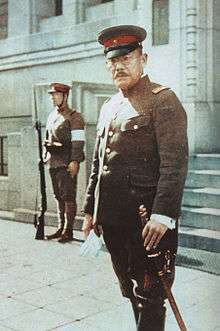Kōhei Kashii
Kōhei Kashii (香椎 浩平, Kashii Kōhei, January 25, 1881 – December 3, 1954) was a lieutenant-general in the Imperial Japanese Army.
Kōhei Kashii | |
|---|---|
 | |
| Born | January 25, 1881 |
| Died | December 3, 1954 (aged 73) |
| Service/ | Imperial Japanese Army |
| Years of service | 1901–1936 |
| Rank | Lieutenant-general |
Kashii was born in Fukuoka Prefecture, graduated from the Imperial Japanese Army Academy, and became a lieutenant-general in 1931.[1] He was the commander of the Japanese China Garrison Army from 22 December 1930 to 29 February 1932. In November 1931, Kashii imposed martial law over the Japanese-ruled area of the Chinese city of Tientsin (now Tianjin).[2]
In the February 26 Incident attempted coup d'état of 1936, Kashii was a leader of government forces that suppressed the revolt.[3] Since he was sympathetic to the Imperial Way Faction, which included some of the officers who started the coup, he initially resisted military action against the revolt.[1] He was later relieved of his duties, and then transferred to the reserves.[1]
References
- "Kashii Kōhei". Nihon jinmei daijiten+Plus (in Japanese). Kōdansha. Retrieved 11 April 2014.
- "Japanese Ultimatum". The Cairns Post. 28 November 1931. Retrieved 10 April 2014.
- "Tokyo Quiet". The Sydney Morning Herald. 3 March 1936. Retrieved 10 April 2014.